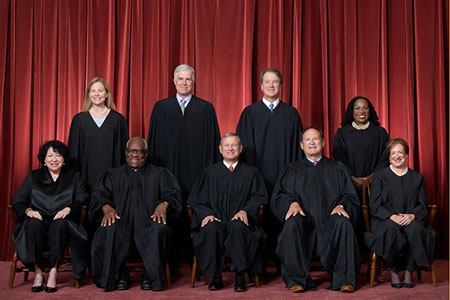by WorldTribune Staff, April 26, 2024
A majority of Supreme Court justices on Thursday appeared sympathetic to the argument from Donald Trump’s attorneys that a president maintains some level of immunity after leaving office.
The court heard oral arguments regarding if Trump is immune from prosecution on charges of attempting to overturn the results of the 2020 election, as Special Counsel Jack Smith claims.

The ultimate question will be the establishment of a standard.
The Supreme Court is expected to rule on the case by June. If the Court institutes a test, it would vacate the lower court decision that former presidents have no immunity, sending that case back to trial court, legal analysts said. The trial court would then undergo a point-by-point analysis on each fact to determine if immunity exists.
In a major blow to Smith and his boss Joe Biden, the likely scenario would ensure the final outcome of a Trump trial in D.C. comes well after the Nov. 5 election.
“The U.S. Supreme Court had a monumental hearing on immunity … and I think it was made clear, I hope it is very clear that a president has to have immunity,” Trump said on Thursday.
Trump echoed his past argument that without immunity the president would be reduced to just a “ceremonial” position.
“That’s not what the founders had in mind,” he said.
Justices appeared to agree the institution of the presidency would be crippled if presidents are subject to criminal prosecution for anything they’ve done in office by anyone who might accuse them of wrongdoing.
George Washington University law professor Jonathan Turley noted: “If the justices want insight into the implications of denying any immunity, they just need to look north to New York City. The ongoing prosecution of Trump is legally absurd but has resulted in the leading presidential candidate not only being gagged but prevented from campaigning. Alvin Bragg is the very personification of the danger immunity is meant to avoid.”
Justice Samuel Alito asked the government’s attorney, Michael Dreeben, if a president is in a “peculiarly precarious position” due to the nature and consequences of his duties.
“Presidents have to make a lot of tough decisions about enforcing the law, and they have to make decisions about questions that are unsettled, and they have to make decisions based on the information that’s available,” Alito said. “Do you really, did I understand you to say, well, you know, if he makes a mistake, he makes a mistake; he’s subject to the criminal laws just like anybody else?”
Dreeben argued that a president “has access to legal advice about everything that he does. Making a mistake is not what lands you in a criminal prosecution.”
Alito was dubious of Dreeben’s claim that a president enjoys a level of protection because federal grand juries would not indict without evidence. Alito cited the “old saw about indicting a ham sandwich,” continuing to ask, “You come across a lot of cases where the U.S. attorney or another federal prosecutor really wanted to indict a case and the grand jury refused to do so?”
Dreeben acknowledged that, after which Alito quipped, “Every once in a while there’s an eclipse too,” to laughter.
Even the three liberal justices seemed open to there being some level of presidential immunity that endures past the term of office.
Politico lamented: “While Smith looked on from a counsel table, the justices repeatedly emphasized the repercussions of their decision for the future of the republic, counseling a slower approach that is almost certain to push a potential trial into 2025 — and potentially foreclose it altogether if Trump wins the election and unravels the case. In fact, the conservatives on the court repeatedly insisted they were not opining on the specific charges against Trump or even particularly concerned about it.”
“I’m not focused on the here and now of this case,” said Justice Brett Kavanaugh, a Trump appointee. “I’m very concerned about the future.”
Justice Neil Gorsuch, another Trump appointee, agreed: “I’m not as concerned about this case so much as a future one. We’re writing a rule for the ages.”
